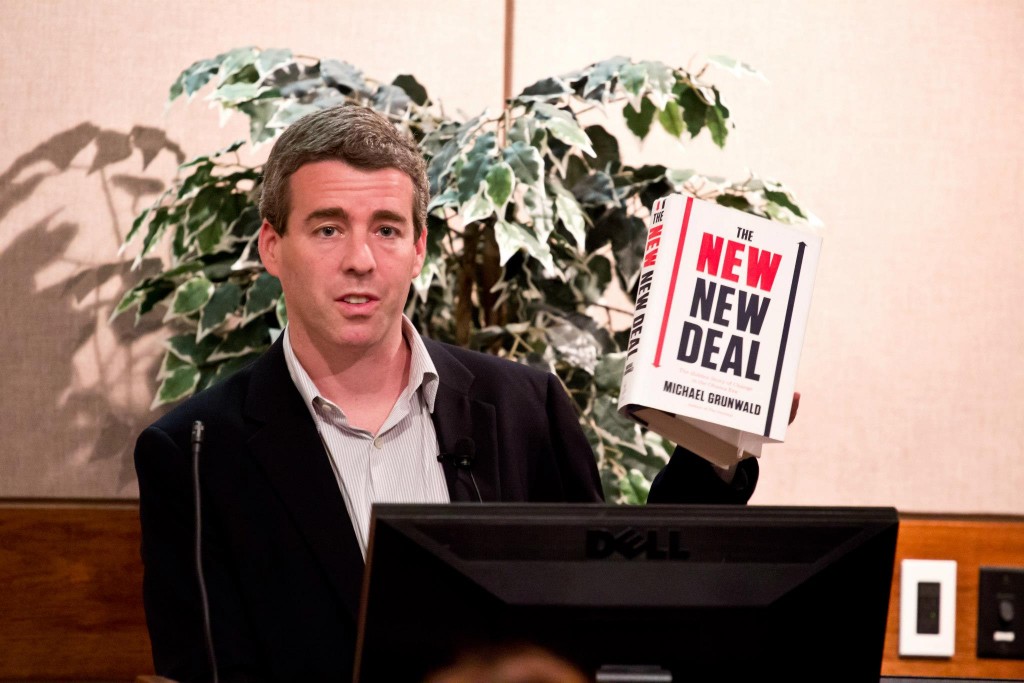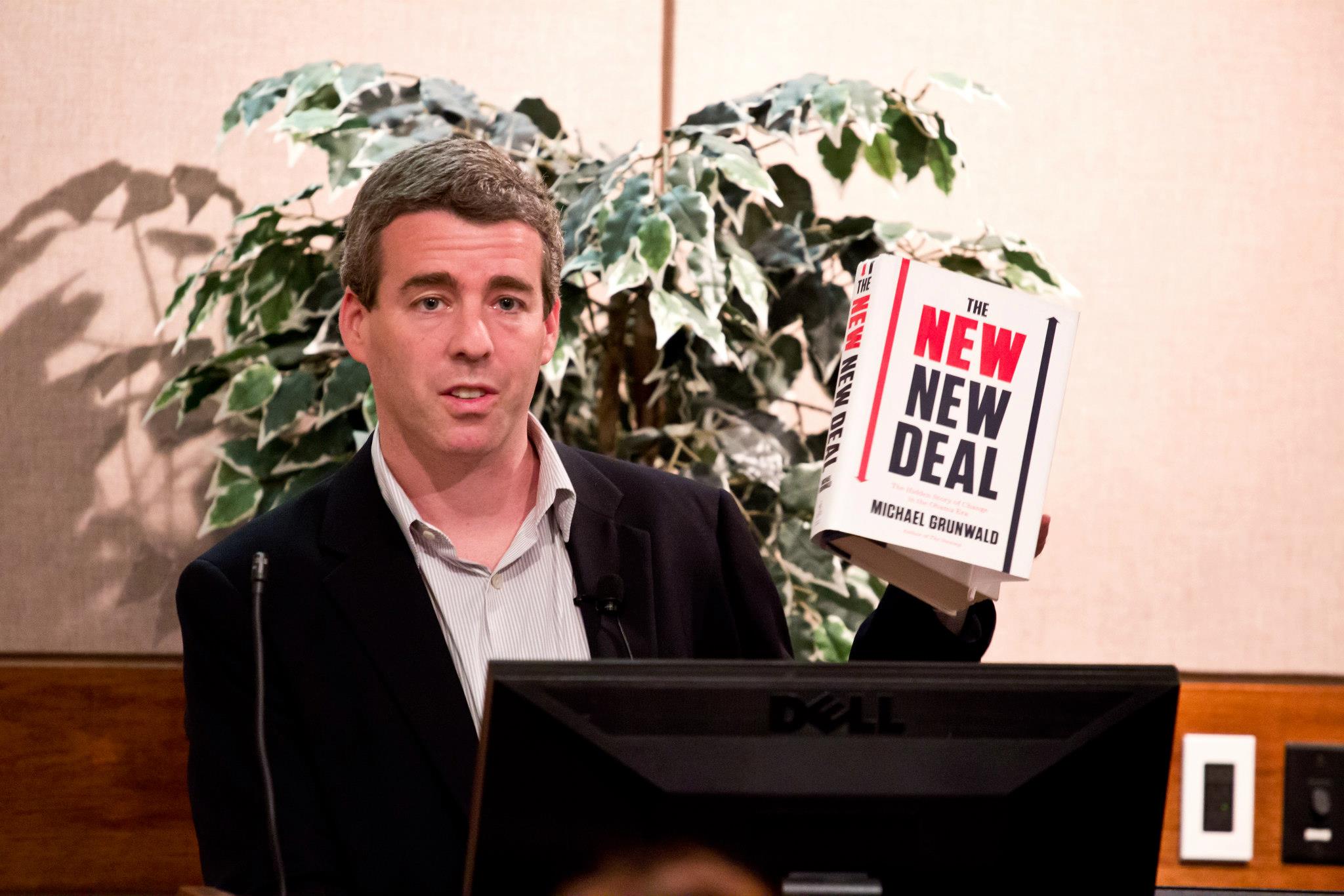
What happened to the stimulus? Once heralded as the greatest early victory of the Obama administration, the American Recovery and Reinvestment Act of 2009 has become a topic that the administration has no urge to discuss. This seems like a natural response to a policy that has failed, or at least failed according to the arguments of countless conservative political figures. And on the surface, these arguments seem to be correct, as unemployment remains near 8% and the nation’s output gap remains around 1 trillion dollars. This is the notion that Michael Grunwald attempts to dispel with his new book, The New New Deal.
While it is easy to assume that a detailed, in-depth assessment of a large piece of legislation would be boring, Grunwald finds a way to keep his book interesting without taking away from the intellectual argument. Grunwald tells the story of the stimulus package, from early conception during the Presidential race to about two years after implementation. What really shows throughout this book is his ability to explain detailed concepts and proposals in ways that even policy novices can understand with little issue.
Grunwald’s goal is not to persuade through partisan appeal, but instead to do so through empirical evidence at both the micro and macroeconomic levels. That micro analysis is what distinguishes this from most journalistic interpretations of the stimulus, as most media reports only focused on large scale issues such as GDP growth and unemployment. And while these major economic factors are still integral to his analysis, Grunwald also writes about specific investments that he sees as significant.
This economic dualism was best exemplified when I sat down with Michael Grunwald and asked him what he considered to be the biggest success of the stimulus. His response was, “preventing a depression, taking a free falling economy and putting a floor under it. And then beyond that I would say the sort of long term reinvestment, the way it has launched this clean energy revolution, the health IT [information technology] revolution, starting education reform.” The specifics of these policy results are discussed at length within the book, and through his discussion, Grunwald is able to expand upon the idea that the stimulus brought us closer to revolutionary change. It is clear that Grunwald viewed the stimulus as an overall success; however he was quite willing to point to a few major failings that surrounded it.
Throughout the book, Grunwald argues that while the stimulus was successful policy, it was a political failure. He made this very clear when I spoke with him, stating, “The biggest failure was certainly political, to some extent it may have been unavoidable. It got the president off on a terribly wrong political foot, where it united the Republicans, where it made Obama look like a big spender, and he never really got his message together about it. And it became hideously unpopular, really fast.” And this is something he writes about throughout the book, focusing heavily on the messaging failure and the unified Republican front that trumpeted the legislation as a failure.
Grunwald notes early that this failure in messaging was mostly in that “The administration marketed it as a measure to prevent rampant unemployment – and then rampant unemployment happened anyway.” While it did prevent some unemployment and possibly prevented the economy from entering into a full scale depression, the stimulus’ effects were not enough to prevent unemployment from reaching ten percent. Republicans were able to capitalize on these failures in marketing and were able to use this opportunity as a way to pull themselves together after a sizable electoral defeat.
For the book, Grunwald sat down with members of both parties to discuss different facets of the stimulus and its policy and political effects. These interviews detail just how the Republicans were able to coalesce around their message, a point best shown by former Republican senator George Vonovich, who stated, “’If he (President Obama) was for it… we had to be against it.” This makes sense, considering that the Senate minority leader Mitch McConnell had been rallying his caucus to work against the stimulus and force President Obama to deplete his political capital early. As Grunwald writes, “The stimulus was exactly the kind of legislation that McConnell wanted Republicans to oppose en masse, to create a narrative of conflict while letting the Democrats own massive increase and debt… Even before the bill was unveiled, he [McConnell] was raising public alarms about a partisan rush to fund ‘mob museums’.” McConnell’s to use the stimulus as a unification tool for his caucus changed the politics around the stimulus, and undercut President Obama’s desire for it to be bipartisan.
The release time for the book is quite indicative of what Grunwald really hoped to accomplish with this book, which is to foster a more intelligent and informed discussion on the stimulus in time for the election. Having seen that the national conversation about the stimulus was not covering major aspects, he wrote this book to right that wrong. That said, when I spoke to Grunwald, he acknowledged that President Obama had been making some strides in that regard. He told me that, “Well, I think Obama is now talking about things that were in the stimulus, without mentioning the word stimulus. You hear him talk more about how it doubled renewable energy, expanded Pell Grants, cut taxes for the middle class.” Though, as Grunwald also joked, “I’m the guy on twitter yelling, ‘That was in the stimulus! That was in the stimulus! Say stimulus!’And he’s obviously not going to say stimulus.” Grunwald’s exasperation with President Obama’s fear of using the term stimulus is clear, but he has been quite relieved to see the president actually talking about what the bill accomplished.
The New New Deal is a must read for anybody interested in the stimulus package. While there is a lot of information in the book, it is also presented in an easy to understand manner. Though Grunwald has an obvious point of view on the stimulus, he presents the facts in a fair manner, giving all viewpoints a chance to be heard. In essence, the book is a perfectly timed release and will hopefully foster a more informed discussion on the stimulus.
Robert Cohen
Political Science ’15
http://www.cbpp.org/cms/index.cfm?fa=view&id=3252
Grunwald, Michael. Personal Interview. September 13 2012.
Michael Grunwald, The New New Deal, (New York: Simon and Schuster, 2012).



